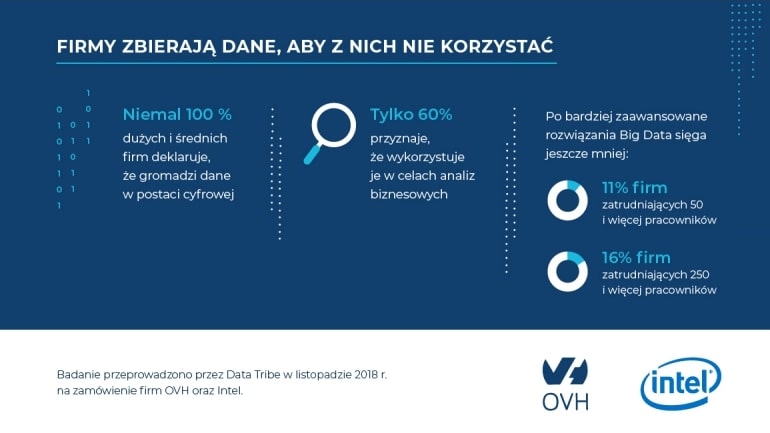 source: biznes.newseria.pl
source: biznes.newseria.plNearly 100 percent of large and medium-sized companies in Poland admit to gathering data. However, more importantly, 60 percent of respondents say they use this data for business analytics. Yet, only 11 to 16 percent of Polish companies, depending on their size, currently use Big Data solutions. Of those that do not use Big Data, only 2 percent plan to adopt it in the coming year. According to the OVH and Intel survey, the main reasons for low interest in Big Data are:
- lack of need - 77.5% of respondents
- lack of expertise - 10% of companies
- high costs of implementation - 2% of responses
- Contrary to popular belief that only the largest companies can afford these advanced solutions and that high costs deter SMEs, our research shows that the reason may lie elsewhere - Polish entrepreneurs do not see the benefits of Big Data implementation, says Robert Paszkiewicz, Sales Director at OVH Poland. - Therefore, educating the market on what Big Data is, the value it can bring, and who can benefit from it is essential. Only then can companies see that using digital data ultimately offers greater opportunities than initial costs.
The OVH and Intel study also shows that almost half of the companies currently using Big Data intend to continue investing in analytics in the future. However, among companies that have not previously used Big Data, only 2 percent intend to do so in 2019. This seems to confirm that raising awareness of the benefits of Big Data is crucial for technology adoption.
Big Data in Poland
It’s worth noting that Polish companies use Big Data selectively. When asked which types of collected data are analyzed, respondents primarily pointed to geolocation data from mobile devices (almost half of the companies) and data generated by social media (45 percent of responses). Only 29 percent analyze proprietary data collected from smart devices and sensors. Consequently, collected data is most often used for market forecasting (in 55 percent of cases).
- The Polish market currently invests in Big Data primarily for marketing purposes and in the e-commerce segment to better understand customers and boost sales. Optimistically, we also see increasing investments in Big Data in logistics, production, telecommunications, and finance, says Robert Paszkiewicz from OVH Poland.
Will Cloud Drive Big Data Growth in Poland?
According to forecasts, demand for data analytics solutions in Poland could increase by 25-30% next year. Interestingly, one of the main catalysts for the "datafication" of Polish businesses will be, in addition to easier access to these tools and higher awareness among entrepreneurs, the growth of public cloud.
- Simply implementing advanced tools is not enough. As Big Data develops, so will the perception of the technology itself. Companies will increasingly focus on proper data selection and analysis processes. In this way, Big Data will evolve into "Smart Data" to meet the requirements of a constantly changing business environment, says Robert Paszkiewicz.
The study was conducted by Data Tribe in November 2018 on behalf of OVH and Intel.
COMMERCIAL BREAK
New articles in section Law in media
Dietary supplement ads in Poland. Who keeps influencers in check?
Newseria, KFi
One in three Polish internet users considers influencer recommendations when deciding on medicines and dietary supplements. Although promotion of such products is regulated, there are still cases of advertising that skirt the law.
SEO Poisoning. Hackers Use Search Engines to Target Businesses
Piotr Rozmiarek
Search engines help us quickly find information, but they can also be used by cybercriminals. SEO poisoning is a tactic where attackers manipulate search engine rankings to place harmful websites at the top of search results.
Phishing in the Cryptocurrency Industry. Fake Recruitments Steal Data
Piotr Rozmiarek
Security researchers have detected a social engineering campaign targeting job seekers in the Web3 industry. The attack aims to conduct fake job interviews via a meeting application that installs information-stealing malware.
See articles on a similar topic:
SLAPP Lawsuits in Europe. How Journalists and Activists Are Silenced
Krzysztof Fiedorek
The number of strategic lawsuits aimed at intimidating journalists, activists, and civil society organizations is increasing in Europe. According to the CASE SLAPPs Report 2024, as many as 1,049 such cases were identified between 2010 and 2023.
Harassment of Female Journalists in Poland. Zamenhof Institute Report
RINF
Over half of female journalists have experienced harassment. The report and a dedicated website for the project, offtherecord.zamenhof.pl, present real, anonymous stories of harassed female journalists, along with numerical data documenting the scale of the issue.
Cyber Threats 2023: Phishing Dominates, AI Targeted
Krzysztof Fiedorek
The CERT Orange Polska 2023 report reveals a rapidly evolving cyber threat landscape. Phishing has taken a decisive lead, accounting for over 44% of reported incidents. Advanced social engineering techniques, deepfakes, and a surge in malicious ads lure users with promises of quick profits or easy opportunities.
Online Hate in Numbers. What Do We Think About Offensive Comments?
KFi
Nearly 70% of adults have encountered online hate. The group most affected includes individuals aged 18-24, with 81% reporting exposure to hateful content - according to the report "Hate on the Internet," prepared by the polish Foundation "W zgodzie ze sobą" in cooperation with Maison&Partners and the Ariadna research panel.






























